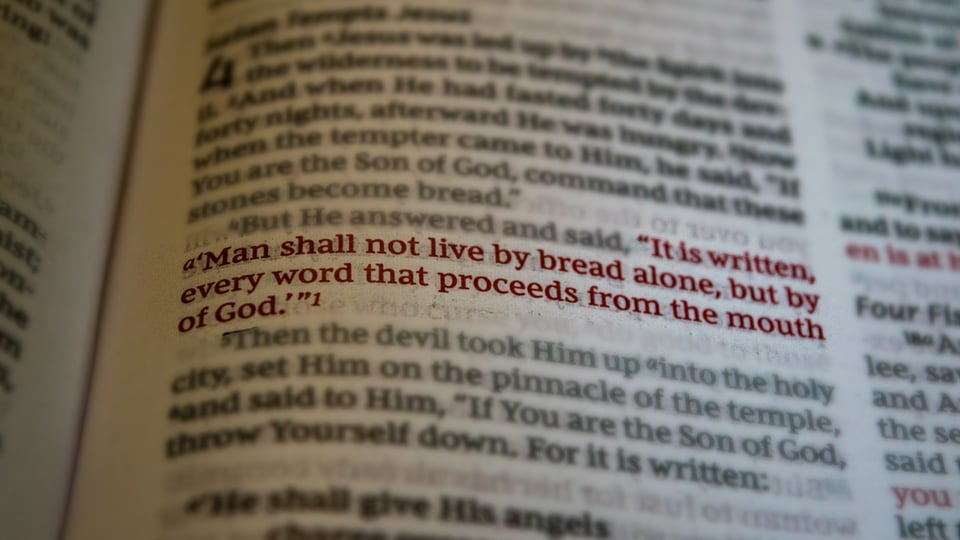Every Word That Comes From the Mouth of God
God wants us to follow every one of His words. Is there harm in doing otherwise? Can we ever add to or take away from His words based on circumstances?

“Man shall not live by bread alone,” Jesus famously said, “but by every word that proceeds from the mouth of God” (Matthew 4:4, emphasis added throughout).
But did Jesus really mean “every word”? Was this just hyperbolic language? Does God really have the right to tell us what to do?
Ancient Israel took away from the Word of God
You may find it surprising to learn that Jesus was quoting from the Old Testament (Deuteronomy 8:3)—which is often ignored and wrongly thought to be irrelevant today.
In Deuteronomy 12:32 Moses admonished the people of Israel: “Whatever I command you, be careful to observe it; you shall not add to it nor take away from it.” (Moses repeated this admonition to “be careful” at least 14 times in the book of Deuteronomy.)
But apparently repetition had little long-term effect on the children of Israel.
Consider how privileged these people were to have personally witnessed miracle after miracle. Among the miracles they had seen were the 10 plagues that devastated Egypt, their protection from the 10th plague (the death of the firstborn), the splitting of the Red Sea and being led by the pillar of cloud (by day) and fire (by night).
Did those instances of supernatural intervention move the Israelites to obey every word of God? No!
God’s patience with Israel was repeatedly tested by their negligence to keep His entire law.
From the very beginning—within days of escaping Egypt—the Israelites demonstrated their frail commitment by ignoring various commandments. They subtracted and often took away from what God required.
One example of that can be found in Exodus 16, where God caused manna to fall six days a week to feed the grumbling Israelites.
His direct instruction was that they were to gather what they needed for the day, except on the sixth day. On the sixth day they were to double what they gathered to avoid breaking the Sabbath by gathering on the seventh day (verses 22-26).
Many dutifully followed the commandment to collect manna daily, but some apparently rejected or forgot the instruction to gather extra on the sixth day. They either reasoned in their minds that God did not really mean what He said or thought His commandment was optional or just forgot it.
Thus, they broke the Sabbath by trying to gather manna, failing to obey “every word.” They subtracted from God’s commandments (verse 27). To put it another way, they left an instruction on the list unchecked, which angered God greatly.
“How long do you refuse to keep My commandments and My laws?” God asked (verse 28).
Again in Exodus 32 we find the story of the golden calf. This was another example where the Israelites neglected to follow several major commandments, not the least of which were idolatry, making a graven image and adultery.
Their failure to obey every commandment they had just heard thundered from Mount Sinai earned them God’s wrath (verse 35).
The book of Judges also chronicles how the Israelites continuously failed to observe all of God’s commandments, with the people of each successive generation doing far less than what was expected of them.
Centuries later, when the nation of Israel was united under a monarch, God spoke through His prophets and condemned the people for their lack of obedience. That is, for following commandments here and there, while ignoring vast portions of God’s law (Ezekiel 22:26).
These examples make it clear that God’s patience with Israel was repeatedly tested by their negligence to keep His entire law.
From the time they fled Egypt right on down to when they were taken captive by Assyria and Babylon, the children of Israel disobeyed God continually by subtracting from His commandments.
Because of their carelessness in obeying every word, they were punished repeatedly. Their story should serve as a reminder to every Bible student about the peril of taking away from God’s law.
The Pharisees added to the Word of God
But whereas ancient Israel was guilty of subtracting from God’s commandments, some of the post-captivity religious leaders were guilty of adding to God’s commandments.
Apparently, sometime during the intertestamental period—the time between when the Old and New Testaments were written—the religious authorities began forming a hedge around God’s commandments. They added various rules designed to keep people from violating God’s law.
What probably began as a well-intentioned attempt to obey God and avoid another bout in captivity eventually morphed into an entirely new kind of religion. The religion God gave to Moses became so saturated and overlaid with man-made traditions that the customs sometimes even replaced God’s commandments.
By getting picky and imagining a violation of tradition to be an offense against God, they were attempting to elevate man-made commandments to the God plane.
By the time Jesus of Nazareth arrived on the scene, the law God had given to Israel was not being faithfully preserved or taught. It had a new look instead, something that terribly displeased Jesus, as He expressed on several occasions.
Mark 7 records one of His confrontations with the Pharisees on this issue of changing God’s law by adding hundreds of man-made rules.
The chapter opens up with some upset Pharisees and scribes chiding Jesus for allowing His disciples to eat with unwashed hands.
Verses 3 and 4 explain their frustration: “For the Pharisees and all the Jews do not eat unless they wash their hands in a special way, holding the tradition of the elders. When they come from the marketplace, they do not eat unless they wash. And there are many other things which they have received and hold, like the washing of cups, pitchers, copper vessels, and couches.”
You can take a magnifying glass to the Old Testament and still fail to find a prohibition against eating with unwashed hands. Mark makes it clear that Jesus’ disciples were not violating God’s law by not doing the ritual hand washing—they were violating “the tradition of the elders.”
The tradition of the elders was not divine instruction. To treat it as though it was sacrosanct would be to “add” to God’s law. God warned them precisely about doing that.
Quoting from Isaiah 29:13, Jesus said, “This people honors Me with their lips, but their heart is far from Me. And in vain they worship Me, teaching as doctrines the commandments of men” (Mark 7:6-7).
Jesus called these pseudo-religious customs the “commandments of men,” and they were exactly that. By getting picky and imagining a violation of tradition to be an offense against God, they were attempting to elevate man-made commandments to the God plane. No human being, regardless of the authority he claims, has the right to do that.
For that reason, Jesus severely corrected the religious leaders here and in other parts of the Gospel accounts.
The lesson is, nobody can improve on God’s law.
God is not recruiting human beings to somehow make His law better. God alone has the prerogative to modify His own commandments.
Avoid the two extremes of adding or subtracting from God’s Word
God is not whimsical about anything He says or does. If He repeats an instruction about being careful not to change His law, there is a reason for it.
God is not whimsical about anything He says or does. If He repeats an instruction about being careful not to change His law, there is a reason for it.
He knows that human beings tend to be loose and careless with His commandments. We often try to play games with His law and customize it in a way that suits our preferences.
The examples cited in this blog post show that God is serious about our preserving and following His law.
Both ancient Israel and the religious leaders in the first century failed. The former showed the problem of subtracting from God’s law, and the latter showed the problem of adding to it.
Neither of those options are acceptable before God.
Our responsibility is to obey every word that comes out of His mouth, every word recorded in the Scripture.
Concerning those immortal words, applicable to every generation for all time, Jesus clarified, “Heaven and earth will pass away, but My words will by no means pass away” (Luke 21:33).
Let’s remember that and strive to live by “every word that proceeds from the mouth of God.”
Date Posted: November 18, 2022



